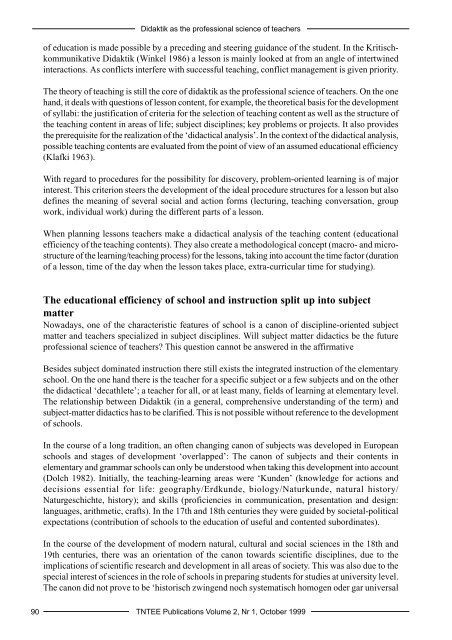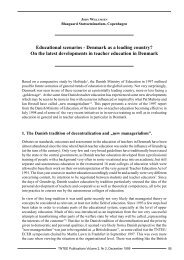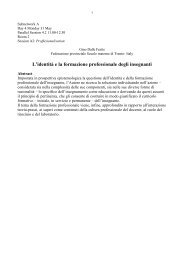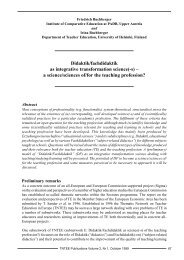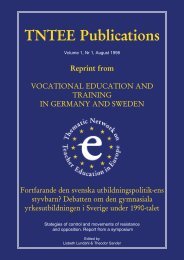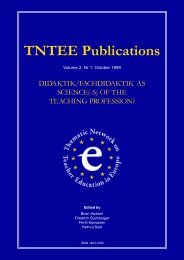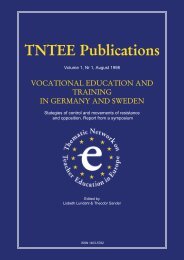Didaktik as the professional science of teachers - tntee
Didaktik as the professional science of teachers - tntee
Didaktik as the professional science of teachers - tntee
You also want an ePaper? Increase the reach of your titles
YUMPU automatically turns print PDFs into web optimized ePapers that Google loves.
90<br />
<strong>Didaktik</strong> <strong>as</strong> <strong>the</strong> <strong>pr<strong>of</strong>essional</strong> <strong>science</strong> <strong>of</strong> <strong>teachers</strong><br />
<strong>of</strong> education is made possible by a preceding and steering guidance <strong>of</strong> <strong>the</strong> student. In <strong>the</strong> Kritischkommunikative<br />
<strong>Didaktik</strong> (Winkel 1986) a lesson is mainly looked at from an angle <strong>of</strong> intertwined<br />
interactions. As conflicts interfere with successful teaching, conflict management is given priority.<br />
The <strong>the</strong>ory <strong>of</strong> teaching is still <strong>the</strong> core <strong>of</strong> didaktik <strong>as</strong> <strong>the</strong> <strong>pr<strong>of</strong>essional</strong> <strong>science</strong> <strong>of</strong> <strong>teachers</strong>. On <strong>the</strong> one<br />
hand, it deals with questions <strong>of</strong> lesson content, for example, <strong>the</strong> <strong>the</strong>oretical b<strong>as</strong>is for <strong>the</strong> development<br />
<strong>of</strong> syllabi: <strong>the</strong> justification <strong>of</strong> criteria for <strong>the</strong> selection <strong>of</strong> teaching content <strong>as</strong> well <strong>as</strong> <strong>the</strong> structure <strong>of</strong><br />
<strong>the</strong> teaching content in are<strong>as</strong> <strong>of</strong> life; subject disciplines; key problems or projects. It also provides<br />
<strong>the</strong> prerequisite for <strong>the</strong> realization <strong>of</strong> <strong>the</strong> ‘didactical analysis’. In <strong>the</strong> context <strong>of</strong> <strong>the</strong> didactical analysis,<br />
possible teaching contents are evaluated from <strong>the</strong> point <strong>of</strong> view <strong>of</strong> an <strong>as</strong>sumed educational efficiency<br />
(Klafki 1963).<br />
With regard to procedures for <strong>the</strong> possibility for discovery, problem-oriented learning is <strong>of</strong> major<br />
interest. This criterion steers <strong>the</strong> development <strong>of</strong> <strong>the</strong> ideal procedure structures for a lesson but also<br />
defines <strong>the</strong> meaning <strong>of</strong> several social and action forms (lecturing, teaching conversation, group<br />
work, individual work) during <strong>the</strong> different parts <strong>of</strong> a lesson.<br />
When planning lessons <strong>teachers</strong> make a didactical analysis <strong>of</strong> <strong>the</strong> teaching content (educational<br />
efficiency <strong>of</strong> <strong>the</strong> teaching contents). They also create a methodological concept (macro- and microstructure<br />
<strong>of</strong> <strong>the</strong> learning/teaching process) for <strong>the</strong> lessons, taking into account <strong>the</strong> time factor (duration<br />
<strong>of</strong> a lesson, time <strong>of</strong> <strong>the</strong> day when <strong>the</strong> lesson takes place, extra-curricular time for studying).<br />
The educational efficiency <strong>of</strong> school and instruction split up into subject<br />
matter<br />
Nowadays, one <strong>of</strong> <strong>the</strong> characteristic features <strong>of</strong> school is a canon <strong>of</strong> discipline-oriented subject<br />
matter and <strong>teachers</strong> specialized in subject disciplines. Will subject matter didactics be <strong>the</strong> future<br />
<strong>pr<strong>of</strong>essional</strong> <strong>science</strong> <strong>of</strong> <strong>teachers</strong>? This question cannot be answered in <strong>the</strong> affirmative<br />
Besides subject dominated instruction <strong>the</strong>re still exists <strong>the</strong> integrated instruction <strong>of</strong> <strong>the</strong> elementary<br />
school. On <strong>the</strong> one hand <strong>the</strong>re is <strong>the</strong> teacher for a specific subject or a few subjects and on <strong>the</strong> o<strong>the</strong>r<br />
<strong>the</strong> didactical ‘decathlete’; a teacher for all, or at le<strong>as</strong>t many, fields <strong>of</strong> learning at elementary level.<br />
The relationship between <strong>Didaktik</strong> (in a general, comprehensive understanding <strong>of</strong> <strong>the</strong> term) and<br />
subject-matter didactics h<strong>as</strong> to be clarified. This is not possible without reference to <strong>the</strong> development<br />
<strong>of</strong> schools.<br />
In <strong>the</strong> course <strong>of</strong> a long tradition, an <strong>of</strong>ten changing canon <strong>of</strong> subjects w<strong>as</strong> developed in European<br />
schools and stages <strong>of</strong> development ‘overlapped’: The canon <strong>of</strong> subjects and <strong>the</strong>ir contents in<br />
elementary and grammar schools can only be understood when taking this development into account<br />
(Dolch 1982). Initially, <strong>the</strong> teaching-learning are<strong>as</strong> were ‘Kunden’ (knowledge for actions and<br />
decisions essential for life: geography/Erdkunde, biology/Naturkunde, natural history/<br />
Naturgeschichte, history); and skills (pr<strong>of</strong>iciencies in communication, presentation and design:<br />
languages, arithmetic, crafts). In <strong>the</strong> 17th and 18th centuries <strong>the</strong>y were guided by societal-political<br />
expectations (contribution <strong>of</strong> schools to <strong>the</strong> education <strong>of</strong> useful and contented subordinates).<br />
In <strong>the</strong> course <strong>of</strong> <strong>the</strong> development <strong>of</strong> modern natural, cultural and social <strong>science</strong>s in <strong>the</strong> 18th and<br />
19th centuries, <strong>the</strong>re w<strong>as</strong> an orientation <strong>of</strong> <strong>the</strong> canon towards scientific disciplines, due to <strong>the</strong><br />
implications <strong>of</strong> scientific research and development in all are<strong>as</strong> <strong>of</strong> society. This w<strong>as</strong> also due to <strong>the</strong><br />
special interest <strong>of</strong> <strong>science</strong>s in <strong>the</strong> role <strong>of</strong> schools in preparing students for studies at university level.<br />
The canon did not prove to be ‘historisch zwingend noch systematisch homogen oder gar universal<br />
TNTEE Publications Volume 2, Nr 1, October 1999


